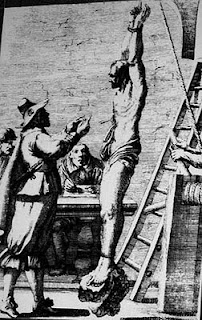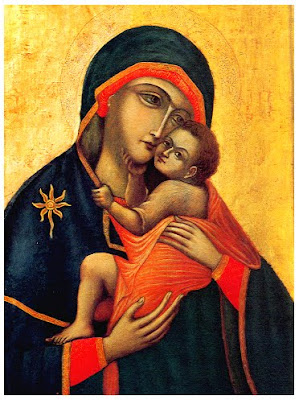
Review of the French film 'Of Gods and Men'. Fr Peter Malone, Signis
"One of the finest religious films, and one of the best Catholic films, in years.
No controversy here. The film won the Ecumenical Prize at Cannes 2010. It also won the Grand Prix du Jury from the festival itself.
The subject is the Trappist community of Mt Atlas, Algeria, in the 1990s. Living their monastic life amongst the local people and ministering to them, especially with medical services, they were viewed more and more with suspicion in the country, especially because they were French expatriates, by government troops who were becoming more active against the increasing terrorist attacks, and by the terrorists themselves. Seven of the monks were killed in the latter part of May, 1996.
While the film expertly builds up the background of post-colonial Algeria, corrupt government, extreme Islamists imposing something like Taliban terror in the towns and villages, the role of the military is ambiguous. Later, and with stronger evidence emerging in recent years with documentation more open and available, the violence perpetrated by both sides, including the military is now under review. The centre of the film, however, is the life of the monks and their preparation for death.
Filmed in Morocco, the film is both beautiful and austere in its landscapes and in the interiors of the monastery – and in the interior lives of the monks and their commitment to God and to their order.
The director, Xavier Beauvois, shows an instinct for depicting the detail of monastic life with sensitivity and a strong awareness of what it means.
His technical advisers have offered expert information which he has absorbed. And the casting is perfect. The actors look, move, speak and act as if they were authentic monks. Lambert Wilson shows the complexity of a man elected to be superior but who has a tendency to make decisions himself but is ultimately willing to be guided in discernment by the whole community. They are eight, while a visiting monk at the end is caught up in the tragedy. Veteran Michael Lonsdale is the ageing doctor who shows practical wisdom in his medical skills and down-to-earth counsel as well as in his religious life.
There is a very striking sequence (making us wonder how we would handle such a situation) where the leader of the rebels comes to demand the doctor come to his camp to tend to a wounded man. The superior stands his ground, says that weapons are not allowed in the grounds and offers to speak outside the walls. He also refuses to give medicine, stating that they cannot give what they have not got. The leader accepts this after they exchange a quotation from the Quran. He offers his hand to the superior to shake. The superior accepts and explains that it is Christmas eve, which the leader understands. Later, the superior and the community will marvel at what they did and how they then went to celebrate Midnight Mass.
The film is able to cover all aspects of the religious routine of the monastery in accurate detail (allowing for Trappists to point out some small things which may not be quite right, but these are not evident to a Catholic eye). In fact, it communicates the life and spirit, the prayer, Eucharist, sung liturgy, silence and contemplation, the detachment of the vow of poverty, the taken-for-granted sacrifices of the vow of chastity, the work, the meals and the readings, the community meetings, the outreach. This is shown in episodes throughout the film which are as effective, even more effective, than a documentary. The film could well serve as a recruitment vehicle because it shows the life as both credible and authentic.
The screenplay does not shy away from deep and reflective words which support the visual action. First of all, the words from the scriptures are most apt, especially about two together, one taken, one left, and the text on losing and gaining one’s life. But, each of the monks is given several opportunities to speak about his vocation and his commitment. This is stronger as the risk situation becomes more dangerous and their lives are threatened.
All the time, the audience is challenged to wonder what they would do in such dangerous circumstances, especially after official advice from the area is given, recommending the monks leave and return to France. At a community gathering, the superior asks them all to give voice to whether each wanted to stay or leave. Some speak in favour of leaving and explain why: family, illness, the opportunity to continue their work elsewhere. Some are still uncertain. Others wish to stay, intuitively knowing that this is where God wanted them to be.
After this, each of the monks has to discern his path in terms of his commitment and understanding of God’s will. One of the monks experiences dark night in his prayer and the sequence where the superior listens, allows him to voice his doubts, is moving, and enables him to find some peace of soul.
After the advice to leave, the monks listen to the opinions of the local people, especially those who come to the monastery for medical help. Their argument is that the monks remain in solidarity with the people. At the final discernment meeting, this argument is given great attention, with Gospel backing and the spirituality of Jesus who stayed faithful until his death. This inevitability of death has been shown to great dramatic effect in the 1989 film Romero, where the archbishop of San Salvador knows that his words and actions and the anger of his opponents can lead only to death.
For an audience wanting to know and understand something deeper about Christian spirituality, something deeper underlying, despite the sins and failures of the church and of church people and the consequent anger at abuse and scandals, these scenes offer a great deal to ponder.
So does the letter that the superior writes before the monks are abducted in vans, audio-taped for their identity, knowing that they are hostages, and led into the snow and the mountains to their deaths. He goes over the decisions and the motivation but also acknowledges that the monks have lived in a Muslim country with its Quranic ideals and spirituality and its God, far from the fanaticism of those who do not really read their scriptures fully or are caught up in bellicose righteousness. There is a quotation from Pascal about the satisfaction in war of those who fight because of religious conviction – which may be merely a worldly ideology rather than religion. The superior's development of the theology of the incarnation and how they themselves will live this theology as they go to death in the same way that Jesus did.
These Trappists of Algeria were not considered saints in the ordinariness of their religious lives. They did their best. However, faced with the reality of impending death, like many a religious or a secular hero, they found their depths, despite any fear, and discovered a martyr’s saintliness in giving a life for others. The director offers this very movingly, without words, as the community sits to enjoy something of a last supper together, the camera focusing on each, their smiles, then their tears, then their deep resignation, drinking a glass of wine together, and all to the powerful rhythms and melodies of Tchaikowsky’s Swan Lake.
Perhaps this makes it sound as if the film is offering a sermon rather than a movie story. It is a movie first and foremost and that is how it delivers its message, through story and in words and moving images."

